[+] Enlarge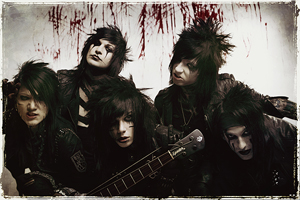

Chad Michael WardAndy Six, center, chose mascara and music over hockey and hasn't looked back with the Black Veil Brides.
During the offseason, Six played other sports, upstaging the kids who teased his ghoulish hair and makeup at their own game. "It was just a way of proving, just because I looked weird and listened to rock 'n' roll, that doesn't mean I'm not an athlete and not talented at what I do."
But it always came back to hockey until music became his priority. Since the former Andrew Biersack hung up his skates and moved to California several years ago, his Black Veil Brides have exploded. Their debut album, "We Stitch These Wounds" (iTunes | Amazon), made an impact on the Billboard charts, and videos for "Perfect Weapon" and "Knives and Pens" have scored millions of views on YouTube.
These days, Six, 20, is hardly recognized as a former all-state and Junior Olympian goalie. After a pair of Las Vegas shows before the Black Veil Brides were preparing to support the Murderdolls in Europe, he got back on the ice with The Life.
The Life: So, who had the better hair, you or Barry Melrose from the World Hockey Association's Cincinnati Stingers?
Six: Later on, I think he had the really quality hair when he became a commentator. At the time, his hair was very epic for me. I looked at it as a very well-crafted coif. It looked great, but I think now I've got better hair.
The Life: Other than Barry Melrose's hair …
Six: That's the main [reason]; that's why I got into [hockey]. [laughs]
The Life: What aspects of hockey caught the attention of a 4-year-old kid growing up in Cincinnati?
Six: It's sort of funny, but I loved the old goalie masks. As a very young kid, I loved Gerry Cheevers and the very scary, hand-painted goalie masks of the old days. I loved superheroes, and I saw this as like the sport of superheroes, all the costumery and everything.
So, before I ever knew anything about the game, my first interest was an aesthetic one, which is sort of funny that I wound up devoting so much of my life to a game and perfecting my skills at it, simply because initially I liked the way it looked.
The Life: But there was also the WWF that could have appealed to that mentality.
Six: Yeah, but for whatever reason, hockey was my thing. And it was angry, and I was a very angry, sort of disenfranchised kid. Even at a very young age, 5 or 6 years old, I was very quiet, and I drew my little handmade comic books. I loved Kiss and all these bands like that, and I loved the idea [that] I could go out and look like a warrior and play this sport. I loved how goalies looked, and that's what got me interested in it.
[+] Enlarge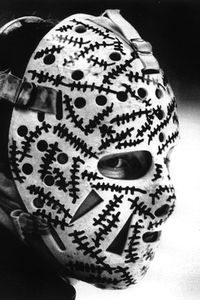

Bruce Bennett Studios/Getty Images Gerry Cheevers' classic mask was Andy Six's gateway to hockey -- and the singer still paints makeup stitches on his face.
The Life: So you took it one step further; that's what you emulated, and that's what you became. What made you a good goalie?
Six: My dad. My dad had never played hockey before and didn't actually know anything about it. He'd grown up in Cincinnati and had seen the old Cincinnati Swords [AHL] and those things as a kid, but he didn't really know much about modern hockey, other than we would watch it now and then -- watch the Stanley Cup or whatever else.
But I told my dad one day, I was like, 'I wanna play hockey, so let's do that.' [laughs] My dad's always been really into sports, and it sort of threw him a bit of a curveball; here's this guy who wants to teach his kid about sports, and he's choosing a sport that he never played. [laughs] So, we sort of did it together. My dad was like, "Well, if you want to do that, then I'm going to help you every single day of your life and you're going to be the best at it."
My dad's always had that mentality in everything that I've done, and I applied almost everything I learned in hockey to music, that if you're going to do something, why not be the best at it? Why not push yourself to be the best at something?
So, we went to like, Play It Again Sports and got some old Franklin pads and a Jason Voorhees-looking mask. We took all the carpeting out of our basement, and I started to learn how to play hockey and be a goalie. I initially started learning on inline skates, just how to stand and skate around the basement and stuff. After that, he would take me to the local ice rink, and I would try to learn how to skate.
Every single day of my life became hockey. Everything I did became hockey so I could become as good at it as possible. From age 5 to probably 15, I played every single day of my life without a day in between.
The Life: How important was hockey as a bond between you and your dad? Did you have any other bonds that became that strong?
Six: No. We would have to drive all over the place, especially when I started getting really heavy into Select Hockey [a player-development program] and AAU tournaments and everything else. He and I would be together in the car, and we would drive all across the country, and I would play hockey. That's how we became as close as we did. On the way we would listen to rock 'n' roll music and talk about bands, talk about hockey, and it just sort of became one and the same.
I would decorate all of my gear, and I would always paint my helmets [with] certain bands' logos and stuff. Music and hockey were sort of one and the same, and that's how I sort of really built any sort of relationship with my dad.
It's funny, 'cause I tour now, being in a band. But I was sort of doing my first tours as a kid in my dad's car, [laughs] going around the country playing hockey.
In the offseason of hockey I would start to play other sports -- I learned how to play football and these other things -- just to sort of keep myself in shape. But over time the offseason of hockey never really came, [laughs] so I would start to play inline hockey in the summer. It was just constant playing.
[+] Enlarge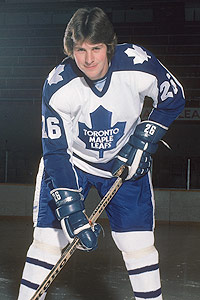

Bruce Bennett Studios/Getty ImagesBarry Melrose, shown in the early 1980s, and Andy Six have Cincinnati hockey connections. (But we couldn't find a 1970s Stingers photo of Melrose.)
The Life: What's your favorite hockey memory, either as a player or a fan?
Six: Oh man, that's difficult because there are a lot of different things. Curtis Joseph is my all-time favorite player. Cujo was the goalie that I looked up to most in my life because he was always sort of known for not necessarily being the most technical goaltender. So, for me, that's sort of what I looked to because I grew up with my dad not really knowing anything [about hockey]. He just taught me to always block everything constantly and be able to take anything from anybody!
I can remember being 5, 6 years old, and it was right when [Joseph] started playing with Toronto, and they were playing against St. Louis or something. We drove to one of their games, and that was a huge moment for me, seeing him play in person and getting to walk up to the glass and watch the whole game. That was a really important memory.
The Life: There aren't a lot of differences in terms of the discipline and regimen of hockey, compared to carving a niche in the entertainment industry.
Six: No! Honestly, I don't think so. I think that everything I learned as a youth, growing up playing competitive sports, especially at the level that I played at, I think I apply all those things every day to the music that I make.
Even just stamina things. When you're on tour, and you're running around the stage every night, you're still putting in 110 percent of yourself physically. All the training that I went through as a kid, to learn how to really hone myself physically in hockey, I use today.
I think even when it comes down to being able to deal in a pressure situation -- I mean, when you're 13 or 14 years old and it's the final round of a tournament or a skills competition, all eyes are on you and it's a pressure situation. I see it the same way as playing a huge venue or something [when] you have a couple thousand people there. I find it to be the same thing.
The Life: So it's the same mindset in terms of performance?
Six: Well, the goalie, to me, will always be the sort of lead singer of the hockey team. At the end of the day, what you're doing sort of makes or breaks the game. When they rush down on you, you either make the save or you don't. If you don't make the save, everybody hates you. But if you do make the save, everybody loves you.
The entire band might have a whole lot of skill and talent. But if the singer opens his mouth and can't sing or trips on his face onstage, everybody will write off the band. I guess I liked that, and I liked the fact that all the pressure was on me. I think it's definitely a very similar mindset of knowing that everybody is looking at you and you can't screw up.
The Life: You were probably about 10 years old when the Blue Jackets came into existence.
Six: Yeah.
[+] Enlarge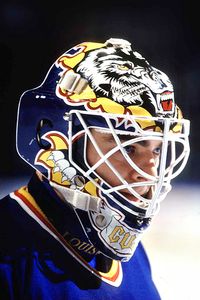

Brian Winkler/Getty ImagesLongtime NHL goalie Curtis Joseph was part of Andy Six's biggest hockey memory.
The Life: And there hadn't been an NHL franchise in Ohio since the Barons left in 1978. Growing up, which team did you follow?
Six: The closest thing I had was the Cincinnati Cyclones in the IHL and the Cincinnati Mighty Ducks. Those were the two teams that I followed the most as a kid. And then when the Blue Jackets came to Ohio I wound up following them because, you know, Ron Tugnutt.
But I was more into minor league hockey. The Cyclones in their day did pretty well. And the Cincinnati Mighty Ducks, while they were still in existence, were not a great team. But they had some great players to learn from, [current Blue Jackets goalie] Mathieu Garon and all these other players who wound up going to the NHL.
The Life: What team and which players do you follow now?
Six: I've always been really into the Blues, for whatever reason. I think maybe just being a little kid, and when Cujo was still on the team. But I stopped so much following specific players. I like the teams that I liked as a kid, and being on tour I don't get to catch a whole lot of games. But whenever I get to see a Blues game, or certainly a Columbus game or whatever else, I'll watch those.
The Life: Those two teams, what do you like about their style of play?
Six: Obviously, the Blue Jackets, when I was younger they were not a very good team. But they've always been sort of scrappy in the way they play. And the Blues have always seemed to have more finesse in the players that they've had.
The Life: At what point did music start to take precedence over hockey?
Six: From the age of like maybe 13 to 15. By 13 I had started my first band. I was getting a little bit of attention with it, and by the time I was 15, Black Veil Brides, my current band, had done fairly well in the local scene.
But I was still playing hockey. It was the offseason of ice hockey, and I was playing inline hockey. I played the NARCh championships -- North American Roller Hockey Championships. It was the final game, and I was on a team called Cincinnati Storm, and we actually won the game.
I was the top player of the skills competition, and I won the MVP of the series. I went back to the dressing rooms -- sorry, I'm so used to saying green room now [laughs] -- the locker room area. I looked at my coach, I looked at my dad and I was like, OK. Well, I'm 15 and I don't necessarily think that I'm going to be going to the NHL. But I know what I'm doing in music is really working, and I think I'd rather go out on top.
My dad and I drove all the way back [home] -- I think we were in Minnesota -- we went to a Guitar Center and he bought me my first PA system. I didn't put on skates again for almost five years.
The Life: After all those years and that much dedication, you don't think you could have made it into the NHL?
Six: I don't know. Maybe I could have, but that's not really where my heart was at, at that age. And, honestly, to this day, I don't regret the decision. I just recently started skating again and getting back out on the ice whenever I'm off tour. I regret not keeping that as a skill and sort of letting that go.
Ultimately, I've wanted to be a rock star since I was young. But I wound up becoming very good at hockey and getting very into that. I'm proud of my decision, and I think I made the right decision -- obviously I did, 'cause my band's working out and doing well.
But who knows what would have happened? I was very skilled at the game, and I'll always love the game. Now that I'm in a situation where I've got a life made for myself and I know what my career is, in my off time from tour I can go to a rink. This year's going to be kind of busy for us as a band, but if I had time I'd love to join a rec league or something.
The first time I actually went skating again, my girlfriend roped me into going ice skating with her, sort of a romantic kind of thing. It was sort of weird for me, putting on skates and going out onto the ice. It was like a bike -- you know, you don't forget how to do it. As soon as I got out there, I had a great time and was doing my old whipping around the rink and everything.
It was a skill that I've always had in my mind and applied to everything I do, but ultimately I'd like to get back to maybe enjoying it in my off time, like any hobby that you have.
[+] Enlarge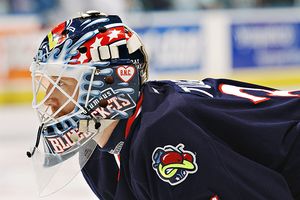

Dave Sandford/Getty ImagesOf course, Ron Tugnutt.
The Life: For something that was such a predominant part of your life for so many years, there's really not a lot of information out there about it.
Six: Honestly, yeah, I'm always surprised when people don't know that I did it. My bass player has been in my band for almost two years and he had no idea [laughs] until he visited my parents' house, because my parents' basement is just full of trophies and pictures and everything from when I was young playing hockey.
Everybody is always surprised, I think. I mean, our publicist had no idea when we were approached about doing this. It's not something that I really think about talking about because I know that it's a part of my life. I guess I'm always surprised.
I think that now, maybe kids will see that I did it and if they have any interest in sports -- you know, you don't have to be a musician solely, or an artist solely or whatever. If you're interested in sports, you can do both. You can have fun with anything you want to do in your life.
The Life: That's a great segue, because the storyline for the "Knives and Pens" video alludes to an outcast kid being bullied by the jock population. But being an athlete, you were one of them!
Six: It's weird, I was bullied by the jock population.
The Life: Really?
Six: Yeah. What's so ironic, and almost in a way sort of angers me a little bit, is that hockey was not seen as a mainstream sport in my area of the country when I was a kid. Like I said, I would have to drive pretty far with my dad to play and whatever else.
The upper elite, rich families, they played hockey. It was sort of like how you see lacrosse in a lot of areas being a game that's only played by the rich kids, because it's an expensive sport to play as a kid. I never really had the best in gear; I had to make up for it in talent. I had the old TPS pads or whatever. [laughs] I never had the nicest gear because, you know, my dad always provided for me, but we were never a rich family.
I was always bullied by the jocks at school, but I always found it sort of ironic that I was better at my skill in my sport and was doing far more at my sport than they were doing being second-string on the high school football team or what have you.
The Life: Did you wear mascara and have blue-black hair dye beneath the equipment?
Six: Yeah, certainly! Especially later. When I was really young, I was just sort of a weird-looking kid. I had long, curly hair and wore Misfits T-shirts and everything else. But later on, when I sort of developed my own identity, I would come to the games dressed like myself and put on all my gear. I was me! I had my long, black hair sticking out of the helmet. [laughs] I was the only guy on my hockey team whose mascara was running underneath my helmet.
The Life: You were all-state and also a Junior Olympian.
Six: Yes.
The Life: Inline or ice hockey?
Six: Both. There's the AAU Junior Olympics in both areas, and I was all-team and Junior Olympian. I won the gold medal on both teams. It's the seasonal tournament of the [U.S. national junior Olympic team]. Basically, if you win the gold medal, you can move on to be on the junior Olympic team. But I didn't really have the [financial] ability at the time. And just being the age that I was at the time, when that wound up happening, I was about 15 years old, and my mind wasn't really in it anymore.
[+] Enlarge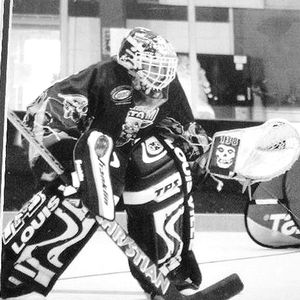

Courtesy of Andy SixAndy Six chose music at 15, but hitting the ice has revived his desire to play hockey again.
The Life: The World Junior Hockey Championships are going on in Buffalo, N.Y., featuring players the same age as you. Do you know, or maybe you even played against, anyone on the U.S. roster?
Six: I may have! [laughs] I'd have to look at it, but it's very well possible. I think anyone in my age group I've played against, pretty much everywhere in the country.
In the offseason I was playing inline hockey, and there was no real competitive inline teams in Cincinnati that did well at national tournaments. So, my dad and I actually started the first major inline select teams in Cincinnati, one being the Cincinnati Swords, which was sort of a takeoff on the old Cincinnati Swords team. The other was the Cincinnati Inline Ducks, which, at the time, was actually sponsored by the Cincinnati Mighty Ducks.
The franchises, [after] I left, they went on to be national champions at NARCh and other things.
I was always taught by my dad, if there's something that you want to do, you should just do it yourself, because no one's going to do it better than you. We threw together our resources and got some sponsors and basically created teams. We would find people that wanted to be a part of that, and we would go around and sort of recruit the best players in the area.
We would sort of make supergroup teams that would compete on a national level, kids that would not otherwise have the opportunity, just because of where they grew up. It's nobody's fault that they're born into a town that doesn't really have hockey. We always saw it that way, so we would find the most talented players and compete at a national level, and typically win because we wanted it a little bit more than the kids from Detroit or wherever who just sort of grew up with it in their blood.
The Life: From the perspective of someone who has actually played the game, is watching a televised hockey event boring as hell?
Six: [laughs] My dad would always get mad at me about that. To learn, I would have to watch the games, to watch technique and things like that. Especially when I was really young, I would just get so bored watching [hockey]. If you're watching a team that you follow, you have the excitement because you want to know how they do. But I don't want to watch the Buffalo Sabres against some team that I don't care about. I think if I liked a goalie on the team, then I could get with it. I like Dominik Hasek, so I can get behind that. [laughs]
I think it's one of those games where you can't feel the intensity of the game on TV. Also, let's be honest here, there really isn't as much attention paid to it in the states as there is with a game like football. If you watch football, they have put so much money into televising games, where you've got 40 different camera angles and a camera on the field, all this other stuff. Basically, when you watch a hockey game, it's a singular camera in the rafters. They just look like little ants down there, and then maybe you get some close-up shots.
They sort of edit football games and baseball games to look like movies. They don't really do that for hockey in the states. Honestly, it's no one's fault, because the game itself doesn't lend itself to being televised as much, I don't think.
The Life: What got you involved in coaching?
Six: Just because it was hockey, and that was my life. I felt like if I wasn't playing, then I wanted to be doing something involving the game. When I was about 14 or 15, I started coaching really young teams, like 7 and up.
If a kid really got into hockey, and they wanted to be a part of it, then they should have the correct kind of coaching and people that are really pushing them. Even at a very young age I wanted to help younger kids get to the point where I was.
The Life: Have you come across any other hockey fans on tour?
Six: No! [laughs] We had a stage manager for a long time who liked hockey quite a bit, but I think that was the only person. [laughs] In the bus we all watch football, and we spend a lot of time watching ESPN. [laughs]
There's no one that really brings up hockey or whatever. When you're on tour, it's sort of "Groundhog Day": You wake up every day and do the same thing. You play your show and try your best to sort of make a connection with the audience for those 45 minutes to an hour that you're onstage. Then, you do the same thing the next day and try to leave behind some impression on the kids. But apart from that, a conversation about hockey is not something that really comes up.
But if there's anyone out there that is into hockey and into rock 'n' roll music, I'd love to talk to them about both.

